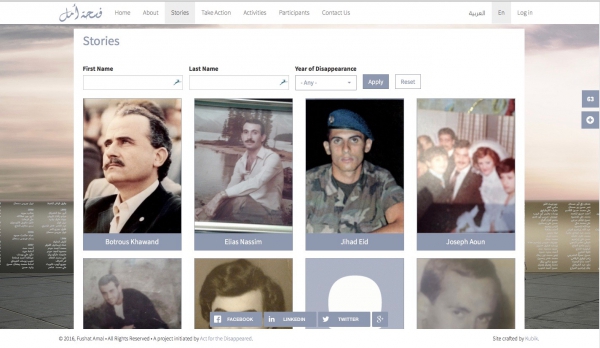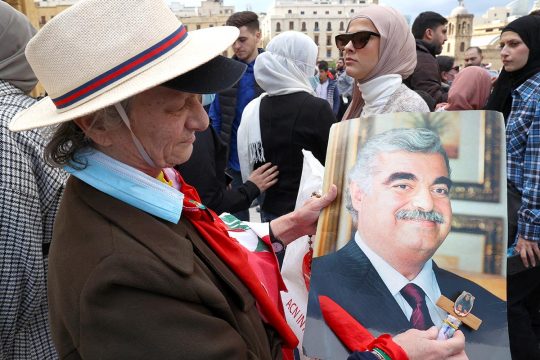Transitional justice is not just about big trials, Truth Commissions and reconciliation processes. This week, Justiceinfo.net looked at the missing persons from Lebanon’s wars, forgotten by history and by a weak State. A government record of war-time casualties put the number of missing persons at 17,415, but this figure has never been cross-checked or verified, and families are still waiting to know what happened to their loved ones. Faced with the silence and indifference of the authorities, a Lebanese NGO, Act for the Disappeared, has taken up the cause and created a searchable interactive database of missing persons for people to consult called “Fushat Amal” (Space of Hope). “Since the launching of Fushat Amal, Act for the Disappeared has received numerous requests by volunteers to carry out interviews, as a way to show their solidarity with the families,” writes Lynn Malouf, lecturer at Université Saint Joseph and board member of Act for the Disappeared, on Justiceinfo.net. “We feel better now, knowing that there are people thinking of us, working with us, and standing by our side,” says the mother of Khaled Hajj Ali, who disappeared in 1985. “Now after 30 years, there are people whom we can talk to and express our concerns.”
Burundi is another forgotten country, where violence and repression are continuing amid general indifference. Tensions in Burundi have also sparked a crisis between Kigali and Bujumbura, which accuses Rwanda of interfering. But Kigali has always rejected these accusations, saying Burundians should solve their internal problems without looking for scapegoats next door. “Any outside attempt to spark the flames in Burundi in any way should be condemned. But the root of the current crisis is in Burundi itself, and any solution must come from there,” an African diplomat in Kigali told JusticeInfo.net. “So the problem is not Rwanda or Belgium or Paul Kagame or Louis Michel (Belgian politician).”
Still in Africa, the start of former Ivorian president Laurent Gbagbo’s trial before the International Criminal Court and this Court’s continuing procedures against Kenyan Deputy President William Ruto have revived the anti-ICC campaign on the African continent. “Since January 31, Kenya and other African countries have been advocating for the 34 ICC member countries on the continent to pull out as a bloc. They claim that this international justice is discriminatory because it has only gone after Africans. Supporters of the International Criminal Court (ICC) say this move reflects the desire of certain African autocrats to get a licence to kill and cover up their dark intent in the name of anti-colonialist struggle,” writes JusticeInfo.net editorial advisor Pierre Hazan, adding that “the ICC has never before faced such a diplomatic crisis, which threatens to sink it”.
But, he concludes, “the existence of the ICC has already produced significant results. It has created a new norm in international law: who could have imagined 30 or 50 years ago that impunity is – in theory - no longer acceptable? It shows that the determination and the mobilization of hundreds, if not thousands of NGOs, victims’ associations and civil society groups can influence the way States conduct their foreign policy, even if the road is still long to build an independent international justice system”.
Elsewhere, transitional justice remained at work for better or for worse. In Côte d’Ivoire, pro-Gbagbo military personnel were given heavy sentences for involvement in the murder of ex-junta leader Robert Guéï, but supporters of current president Alassane Ouattara suspected of war crimes have still not been prosecuted. In Cambodia, a former Khmer Rouge leader claimed at his appeals hearing that he had fought for “social justice”. Croatia arrested the former head of a notorious military jail, convicted of war crimes against ethnic Serbs, who had been on the run for 15 years.
In France, a prosecutor requested a fine on Jean-Marie Le Pen for calling Roms “poisonous” and “smelly”, extreme-right essayist Alain Soral was fined for doing an inverse Nazi salute (“quenelle”) at the Holocaust memorial in Berlin, and a former Guantanamo chief was summoned over allegations of torture and arbitrary detention. Even if unlikely to succeed, this shows impunity has its limits.







